The Positive Ripple Effect of a Strengthening Cedi: Fuel Price Reductions in Ghana
The Ghanaian economy has recently experienced a welcome boost as the national currency, the cedi, has appreciated against the US dollar. This positive shift in the exchange rate has triggered a series of price reductions, particularly in the fuel sector, bringing much-needed relief to consumers across the nation. Oil Marketing Companies (OMCs), recognizing the impact of the stronger cedi on fuel prices, have responded by adjusting their pump prices downwards, effectively passing on the savings to motorists and businesses.
State-owned Ghana Oil Company Limited (Goil), a major player in the fuel retail market, took the lead in announcing price reductions. Effective 6:00 a.m. on Monday, June 2, 2025, Goil lowered the price of petrol from GHS13.27 per litre to GHS12.52, representing a significant decrease of GHS0.75 per litre. Diesel prices also saw a substantial drop, falling from GHS13.87 per litre to GHS12.98, a reduction of GHS0.89 per litre. This move by Goil signaled a positive trend within the fuel market, prompting other OMCs to follow suit.
StarOil, another prominent OMC, swiftly followed Goil’s lead, announcing its own price adjustments. Effective 8:00 a.m. on the same day, StarOil reduced the price of petrol from GHS12.57 per litre to GHS11.77, marking a decrease of GHS0.80 per litre. Diesel prices at StarOil stations also witnessed a significant drop, falling from GHS13.49 per litre to GHS12.49, a reduction of GHS1.00 per litre. These reductions by StarOil further intensified the competition within the fuel market, ultimately benefiting consumers.
In a remarkable move to further alleviate the financial burden on consumers, StarOil went a step further by offering additional discounts at selected outlets across the country. At these designated stations, motorists could purchase petrol (Super) at an even lower price of GHS11.57 per litre, reflecting a total reduction of GHS1.00 compared to the previous price. Diesel prices at these select stations were also discounted further, reaching GHS12.29 per litre, representing a total reduction of GHS1.20. This strategic move by StarOil not only provided significant savings to consumers but also intensified the competition within the fuel retail market, encouraging other players to offer competitive prices.
The driving force behind these fuel price reductions, as highlighted by StarOil in its announcement, is the strengthening of the cedi against the US dollar. The company explicitly stated that the improved exchange rate allowed them to pass on the savings to their customers. This transparency demonstrates a commitment to fair pricing and reinforces the direct correlation between currency fluctuations and fuel prices. By acknowledging the cedi’s appreciation as the catalyst for the price reductions, StarOil reinforces the importance of a stable and robust national currency.
The overall impact of these price reductions is substantial for the Ghanaian economy and its citizens. Lower fuel prices translate directly into reduced transportation costs for individuals and businesses. This can stimulate economic activity, as businesses can allocate saved resources to investments and expansion, while individuals have more disposable income. Furthermore, lower transportation costs can contribute to lower inflation, further stabilizing the economy and improving the overall standard of living. The recent fuel price reductions, driven by the cedi’s appreciation, represent a positive development for Ghana, signaling a potential for sustained economic growth and improved consumer welfare. This illustrates the interconnectedness of currency stability, fuel prices, and overall economic health. The hope is that this positive trend continues, further benefiting the Ghanaian economy and its people.


